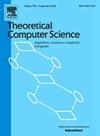Phase transition of the 3-majority opinion dynamics with noisy interactions
IF 0.9
4区 计算机科学
Q3 COMPUTER SCIENCE, THEORY & METHODS
引用次数: 0
Abstract
Communication noise is a common feature in several real-world scenarios where systems of agents need to communicate in order to pursue some collective task. Indeed, many biologically inspired systems that try to achieve agreements on some opinion must implement resilient dynamics, i.e. that are not strongly affected by noisy communications. In this work, we study the 3-Majority dynamics, an opinion dynamics that has been shown to be an efficient protocol for the majority consensus problem, in which we introduce a simple feature of uniform communication noise, following D'Amore et al. (2022). We prove that, in the fully connected communication network of n agents and in the binary opinion case, the process induced by the 3-Majority dynamics exhibits a phase transition. For a noise probability , the dynamics reach in logarithmic time an almost-consensus metastable phase which lasts for a polynomial number of rounds with high probability. We characterize this phase by showing that there exists an attractive equilibrium value for the bias of the system, i.e. the difference between the majority community size and the minority one. Moreover, we show that the agreement opinion is the initial majority one if the bias towards it is of magnitude in the initial configuration. If, instead, , we show that no form of consensus is possible, and any information regarding the initial majority opinion is lost in logarithmic time with high probability. Despite more communications per-round being allowed, the 3-Majority dynamics surprisingly turns out to be less resilient to noise than the Undecided-State dynamics, whose noise threshold value is .
求助全文
约1分钟内获得全文
求助全文
来源期刊

Theoretical Computer Science
工程技术-计算机:理论方法
CiteScore
2.60
自引率
18.20%
发文量
471
审稿时长
12.6 months
期刊介绍:
Theoretical Computer Science is mathematical and abstract in spirit, but it derives its motivation from practical and everyday computation. Its aim is to understand the nature of computation and, as a consequence of this understanding, provide more efficient methodologies. All papers introducing or studying mathematical, logic and formal concepts and methods are welcome, provided that their motivation is clearly drawn from the field of computing.
 求助内容:
求助内容: 应助结果提醒方式:
应助结果提醒方式:


